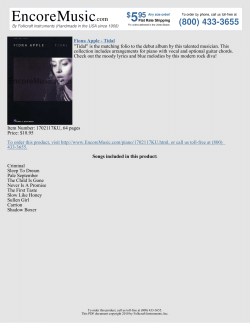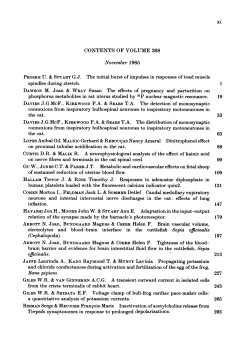
Brochure Ts INGLES baja
Ventilator designed to provide Invasive and Non-invasive ventilation for the critical care management of adult, pediatric and optionally neonate-infant (including premature) patients. OPERATIVE MODES (according to patient category) • VCV - Volume Control (Assisted/Controlled). • PCV - Pressure Control (Assisted/Controlled). • PSV - Pressure Support. • CPAP - Continuous Positive Airway Pressure. • SIMV (VCV) + PSV. • SIMV (PCV) + PSV. • MMV + PSV - Mandatory Minute Ventilation. • PSV + Tidal Volume Assured. • APRV - Airway Pressure Release Ventilation. • NIV - Non-Invasive Ventilation. • TCPL - Time Cycled Pressure Limited (Optional). • SIMV (TCPL) + PSV (Optional). • CPAP with Continuous Flow (with leak compensation for NIV) (Optional). PARAMETER SELECTION (according to operative mode and patient category) • Tidal Volume: 20-2500 mL. *(from 5 ml with the option of neonatal category). • Programmable Minute Volume (MMV + PSV): 1.0-50 L/min. • Resulting Minute Volume: 0.01-130 L/min. • Inspiratory Time: 0.1 – 10 s (in assist/controlled modes). 0.2 – 30 s (Low time in APRV). 0.5 – 30 s (High time in APRV). • I:E Ratio: 5:1 - 1:599. • Respiratory Rate: ADL: 1-100 bpm. PED/*NEO-INF: 1-150 bpm. • FiO2: 0.21-1.0. • Inspiratory sensitivity: Flow Triggered: 0.2-15 L/min. Pressure Triggered: 0.5-20 cmH2O below PEEP. • Expiratory sensitivity for PSV: 5%-80% of the initial peak flow, in steps of 5%. • PEEP/CPAP: 0-50 cmH2O. • Controlled Pressure (PCV): 2-100 cmH2O. • Support Pressure (PSV): 0-100 cmH2O. • Inspiratory Pause (programmable in VCV): 0-2 s. • Inspiratory Flow Waveform (in VCV): Rectangular and Descending Ramp. • Inspiratory Flow (resultant): 0.2-180 L/min. • Continuous Flow (*NEO-INF): 2-40 L/min. • Limited Pressure in TCPL (*NEO-INF): 3-70 cmH2O. • Maximum pressure limited (safety limits): up to 120 cmH2O. ALARMS Light and audible signals according to priority and messages on the screen. The system keeps a record of the occurred events with name, date, and time. This record is printable and cannot be deleted. The system allows the deactivation of Tidal Volume and Minute Volume alarms in NIV. • High and Low Inspiratory Pressure. • Low Pressure of O2and Air, or one of them. • Main Power Loss. • Low Battery. • Depleted Battery. • High Continuous Pressure. • Technical Failure. • Disconnection. • Oxygen not adequate. • High and Low Minute Volume. • High and Low Tidal Volume. • High and Low O2 percentage. • Apnea. • Leak (non-compensable). • Fan Failure. • High Respiratory Rate. • PEEP Loss. OTHER FEATURES AND CONTROLS • 12” color Touch - Screen. • Trends (up to 72 hs). • Loops: Pressure vs Flow, Pressure vs Volume y Volume vs Flow. They can be saved as reference loops. • Sighs (in VCV). • Alarm sound volume regulation. • Suction %O2: for suction sequence with variable FiO2. • Synchronized and FiO2 controlled nebulizer. • Manual Inspiration. • Inspiratory/Expiratory Pause (manual). • Inspiratory O2 sensor. • Standby function. • Watchdog. • Inspiratory relief valve (antisuffocation). • Pneumatic safety valve: 120 cmH2O (±5). • Reusable Expiratory Set (Exhalatory valve and exhalatory flow sensor). COMPLEMENTARY FUNCTIONS • Altitude compensation for volume correction. • Body temperature volume correction (BTPS). • Volume correction according to patient circuit compliance. • Pressure correction according to patient circuit resistance. • Leak compensation available in all operative’s modes. • Tidal Volume Setting based on Ideal Body Weight (IBW). • Possibility to set the VCV mode as Tidal volume + Inspiratory time or tidal volume + Peak flow. • Intra-hospital transport: facilitates the mobilization when the ventilator can only be supplied with oxygen bottles. • Extended event log to record and search the following items: • Alarms / warnings: activated alarms during the ventilation and warnings shown during the self-test. • Adjustments: operative mode, settings and ventilatory adjuncts. • States: Turn on, turn off, Standby, transport, calibrations and battery charge. RESPIRATORY MECHANICS Selection by onscreen menu: • AutoPEEP. • Dynamic and static compliance. • Inspiratory and Expiratory Resistance. • Trapped volume measurement. • Slow Vital Capacity (Non-forced). • Occluded inspiratory effort during 100 ms (P0.1). • P/V Inflections Points. • Maximum inspiratory pressure (Pi max). • Expiratory time constant (TCexp). CONNECTIVITY • RS-232C with DB-9 connector. • VGA output for an external monitor connection. ELECTRICAL REQUIREMENTS • Main Power: 100-240 V / 50-60 Hz. Automatic voltage switching. • Internal Battery: 11.1 V / 7.8 Ah. Automatic recharge. Estimated duration: 2.5 hours when fully charged. Charge level indicator onscreen. PNEUMATIC REQUIREMENTS • Working pressure: 2.0 bar (approx. 29 psi). • Gases supply: Oxygen: Pressure 2.8-6 bar (approx. 41 -87psi). Connector: DISS 9/16"-18. Air: Pressure 2.8-6 bar (approx. 41-87 psi). Connector: DISS 3/4"-16. • Automatic gas switching when one of them is absent in order to allow patient ventilation with the remaining gas. ACCESSORIES • Reusable patient circuit. • Two expiratory ensembles. • Flexible arm with tubes holder. • Water filter for compressed air inlet. • Air supply high pressure hose (3 meters) with 3/4”-16H connectors. • O2 supply high pressure hose (3 meters) with 9/16”-18H DISS connectors. • Nebulizer (complete kit). • O2 sensor. • Neonatal test lung (optional). • Power cord. • Four-wheel cart (with brakes). OPTIONAL ACCESSORIES • Heater-humidifier. Ventilation therapy without compromise.
© Copyright 2025











